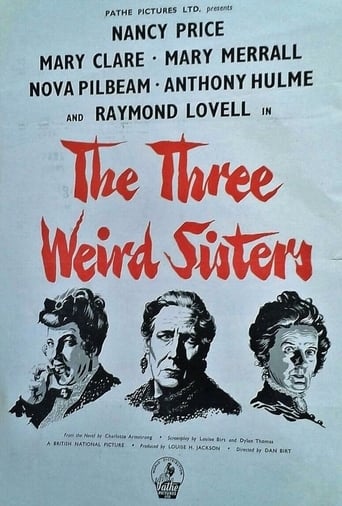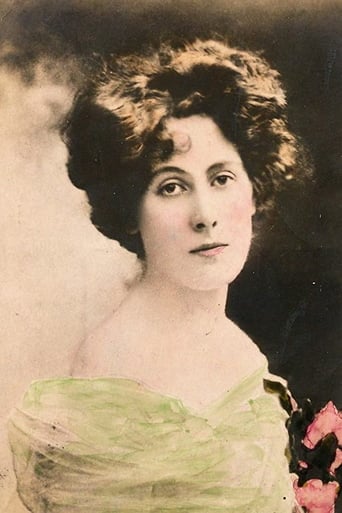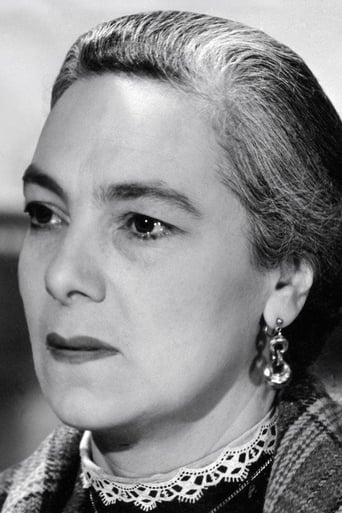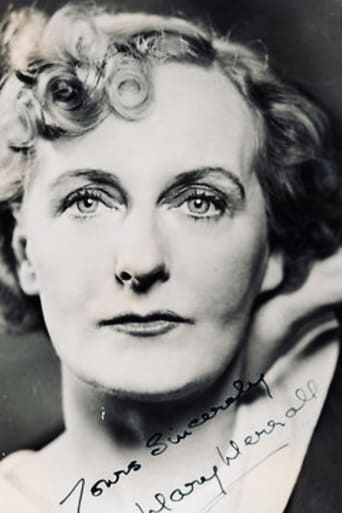

The Three Weird Sisters (1948)
Three older sisters live on their family estate in Wales. This household once proudly reigned over a mining town, but the mines dried up and the estate and the town have fallen on hard times. When the land crumbles and a number of homes in the town are destroyed the sisters promise to rebuild the homes.
Watch Trailer
Cast
Reviews
Fantastic!
Admirable film.
This movie tries so hard to be funny, yet it falls flat every time. Just another example of recycled ideas repackaged with women in an attempt to appeal to a certain audience.
It is an exhilarating, distressing, funny and profound film, with one of the more memorable film scores in years,
I counted in all no less than 6 separate attempts to kill Nova Pilbeam and Raymond Lovell.This rather resembles a Welsh Adams family or the downside of Arsenic and Old Lace.Towards the end it just becomes too laughable to take seriously.Nova Pilbeam fainting away at the sight of the three stern faced sisters.Then the sisters hauling about the furniture and breaking down walls so that they could fix Nova one last time.I have only seen this film once before,many years ago at the BFI Southbank and the ending has stayed with me ever since.So I think that you could say that it is fairly memorable.This was one of a number of rather exotic films that came out after the end of the war.All that repressed emotion no doubt.
Gothic tale of a dying Welsh mining town and the three old ladies who oversee it. Each old lady is afflicted: one is blind, one deaf, and one arthritic.After the town collapses into the coal mine, the old ladies vow to rebuild the town but don't have the money. So they summon their younger brother (Raymond Lovell) from London to come help them and the town. But as he drives into town with his secretary (Nova Pilbeam), someone throws and rock and hits him in the head. At the decaying mansion of his sisters, a doctor (Anthony Hulme) is summoned.But something else is wrong. The brother seems to be ill, and his secretary tries to get information from the doctor, but he seems oddly distant. As the secretary tries to warn the doctor about the sisters' odd behavior, he bristles and tells of how the old ladies put him through medical school.Stranded in the old mansion, the brother again confronts the sisters about money and finally declares he will change his will rather than leave money to the old ladies to waste on a dying town. This seems odd since they are all about 20 years his senior.Odd things keep happening, but when the lawyer shows up to draw up a new will, things come to a head when the doctor realizes that the secretary may be in danger since she is the new beneficiary.The three old ladies are remarkable and are all noted British character actresses. Nancy Price plays Gertrude, the blind one (she also co-scripted the film); Mary Clare plays Maude, the deaf one; and Mary Merrall plays Isobel, the arthritic one.Co-stars include Marie Ault as the housekeeper, Elwyn Brook-Jones as her son, and Hugh Griffith as the town troublemaker.Nova Pilbeam, best known for her 30s films with Alfred Hitchcock, retired from the screen after the release of this film and THE DEVIL'S PLOT in 1948. She was 29 years old.
Co-scripted by Dylan Thomas, this tale of three ageing and infirm, although philanthropically inclined, spinster sisters presiding over a crumbling mansion in 1930s South Wales is an oddball post-War slice of Welsh Gothic. In their hermetically sealed universe, the sisters' otherworldly formalism is threatened, firstly, by a landslip caused by the family mine which destroys part of their small village at the outset and, secondly, by the return of their wealthy and apparently hard-hearted pragmatist brother and his primly efficient secretary, whose modernity further unravels the web of antiquity which has preserved their world. The narrative clunkiness is swiftly apparent from the somewhat obvious symbolism of the structural cracks and fissures which fracture the sisters' home at the beginning of the movie, and the stateliness of the family's surroundings is matched by similarly ossified pacing; Dylan Thomas' occasionally poetically barbed and witty insights notwithstanding. It's not just the old dark house that creaks here; even a nick of time climax does little to shore up the cracks of this crumbling edifice.
This film, whose screenplay was written by poet Dylan Thomas, concerns a lawyer and his young secretary who travel to the Welsh ancestral home of their client to alter his will. Seems the man is the youngest child and only male heir of a once pround family who controlled the local coal mine. The home is presided over by the man's three older sisters, each with a distinctive affliction: one is blind, one is virtually deaf, the other has painful arthritis that has molded her hands into claws. A series of bizarre events begin to occur, particularly to the man and the lawyer's secretary, that ultimately ends in a cataclysmic finale!What we have here is an old set of standards giving way to a new mindset and, to quote the poet himself, the old ways(or sisters)"do not go gentle into that good night"! These three women drift phantom-like through their gloomy mansion, exhibiting the kind of arcane Victorian propriety and claustrophobic narrowness only an isolated life in a wealthy, rarefied setting can bring. Their brother left the house and community to go to school and work, so he doesn't share their outlook. His reappearance, along with that of the free-thinking secretary, challenges the women's way of thinking. The sense of decay shown by the three sisters is heightened by the fact that the mine which has supported them is almost exhausted and, in fact, threatens the town above it by dent of the fact that the tunnels and caverns are dangerously near to collapse. A great sense of gloom and gothic atmosphere prevades the interior shots in the house. Interesting.


